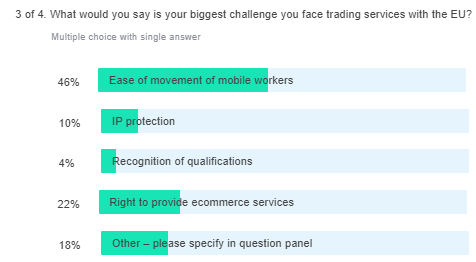Moving workers around the EU has become the biggest challenge for services businesses trading on the continent, according to attendees at an IOE&IT webinar yesterday (7 July).
When asked about their biggest challenge for trading with the EU is post-Brexit, almost a half of the respondents (46%) said “ease of movement of mobile workers”, followed by just under a quarter (22%) saying the “right to provide e-commerce services”.
Over 250 services traders registered for the webinar on new rules for services trade following Brexit.
Border controls
Presenter Tim Thomas, a UK lawyer from the International Employment and Mobility Consultancy Limited, said all Brits providing services are “subject to some form of border controls” when travelling for business in the EU.
This is a result of the UK leaving the European single market when departing the EU in 2020.
While people are Brits are permitted to stay in the EU for 90 days in any six-month period, they will need to get visas for any “client or customer facing work” and the visa requirements will differ between member states, Thomas said.
What counts as a service?
Thomas also said that activities requiring a visa to be undertaken on the continent are not just limited to well-known services such as accounting, the law or training.
“Manufacturers going to service a piece of equipment – whether that’s installing or maintaining it, whether you sell it or not – that counts as a service that we export to the EU,” he said.
“It’s the activity that matters,” he added. “Anything at all that is customer or client facing, however minor you may think that is, counts as a service”.
Webinar
You can watch the webinar – which also featured IOE&IT Academy director Kevin Shakespeare – above or on YouTube, and you can also download the slides here.
Other topics covered included:
- Impact of the EU-UK Trade and Cooperation Agreement on services trade
- Intellectual property rights and how to protect them in the EU
- How professional and vocational qualifications can be recognised in the EU
- Rules for ecommerce and digital trade




